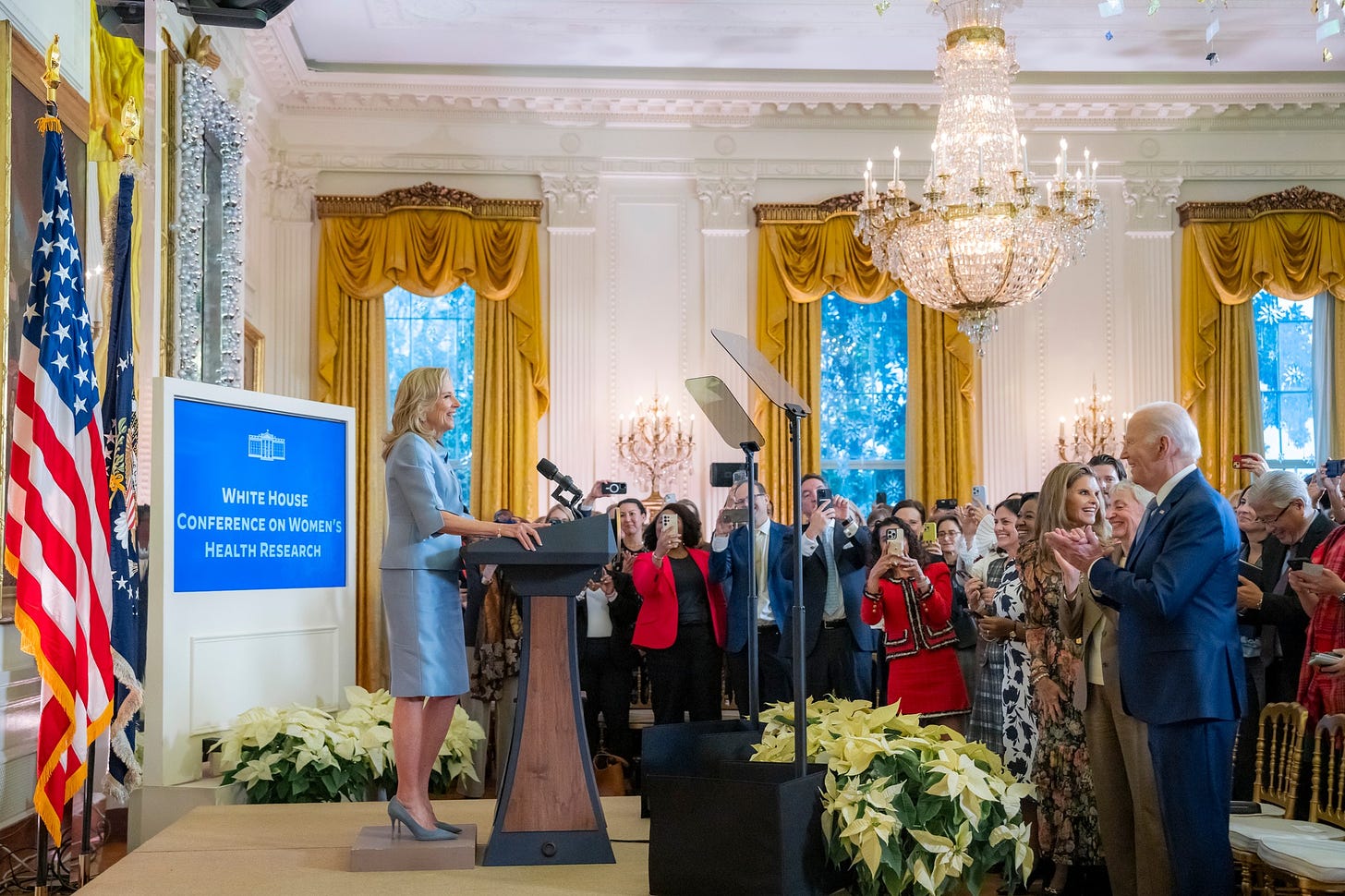President Biden and Vice President Harris issued heartfelt statements mourning the loss of Nikki Giovanni, a celebrated poet, activist, educator, and literary icon. President Biden highlighted Giovanni’s courage, rooted in her early life in segregated Knoxville, Tennessee, and her pioneering contributions to the Black Arts Movement and the Civil Rights era. Through her poetry and activism, she championed racial and gender equality, confronting violence and injustice with unparalleled eloquence. As the author of over 25 books, Giovanni received numerous accolades, including the Langston Hughes medal and an Emmy award. She inspired countless others with her resilience as a three-time cancer survivor. The President extended condolences to her family, including her wife, Virginia, her son, Thomas, and her granddaughter, Kai, and those who cherished her legacy.
Vice President Harris praised Giovanni as a brilliant poet, big-hearted educator, and unapologetic advocate for justice and equality. Giovanni’s work in the Black Arts Movement celebrated Black joy and resilience while challenging societal injustices. Over three decades as an educator, she empowered her students to express themselves through creative writing and mentored hundreds. Harris emphasized Giovanni’s unwavering commitment to an America that embodies the ideals of freedom, opportunity, and dignity for all. She expressed prayers for Giovanni’s family and all who were touched by her remarkable legacy in literature, education, and the ongoing fight for a more just society.
Principal Deputy National Security Advisor Jon Finer met with Colombian Foreign Minister Luis Gilberto Murillo at the White House to discuss regional and bilateral issues. Finer expressed gratitude for Colombia's leadership as the first Country Chair for the Los Angeles Declaration on Migration and Protection, a 2022 initiative involving the U.S. and 21 regional partners to address migration. They also addressed democratic challenges in the hemisphere and emphasized the value of the strong U.S.-Colombia partnership.
The President signed into law:
H.R. 2950, the “Coastal Habitat Conservation Act of 2023,” codifies the U.S. Fish and Wildlife Service’s Coastal Program and supports efforts to assess, protect, and enhance important coastal landscapes.
H.R. 5302, the “Michel O. Maceda Memorial Act,” which designates the Air and Marine Operations Marine Unit of the U.S. Customs and Border Protection located at 101 Km 18.5 in Cabo Rojo, Puerto Rico, as the Michel O. Maceda Marine Unit.
H.R. 5536, the “Grant Transparency Act of 2023,” which establishes transparency requirements for notices of funding availability for Federal grant programs.
H.R. 5799, the “James R. Dominguez Memorial Act of 2023,” which designates the checkpoint of the United States Border Patrol located on United States Highway 90 West in Uvalde County, Texas, as the James R. Dominguez Border Patrol Checkpoint.
H.R. 7218, the “BOLD Infrastructure for Alzheimer’s Reauthorization Act of 2024,” which reauthorizes programs supporting research and resources related to Alzheimer’s disease and related dementias through fiscal year 2029.
H.R. 7438, the “FIFA World Cup 2026 Commemorative Coin Act,” which directs the Department of the Treasury to mint and issue coins in commemoration of the FIFA World Cup 2026 and will be held in the United States for the first time in 32 years.
H.R. 7764, the “Commission to Study the Potential Transfer of the Weitzman National Museum of American Jewish History to the Smithsonian Institution Act,” which establishes a commission to study the potential transfer of the Weitzman National Museum of American Jewish History to the Smithsonian Institution.
H.R. 8932, the “FAFSA Deadline Act,” which requires the release of the Free Application for Federal Student Aid by October 1.
Biden shared personal anecdotes, including the support from the Shriver/Kennedy family during challenging times, and recounted his longstanding connection to the Special Olympics, dating back to its early days. He praised Eunice and Sargent Shriver's legacy and thanked their family for continuing their empowerment mission.
The President emphasized his administration's commitment to disability rights, including efforts to end subminimum wages and address systemic barriers. He highlighted the Special Olympics' global influence in advancing inclusion and praised the athletes for exemplifying the "American spirit" of resilience and bravery.
Closing his remarks, Biden toasted the athletes, volunteers, and supporters, thanking them for inspiring the nation and embodying the best of America. He reaffirmed that the White House, as the People's House, belongs to them and expressed heartfelt gratitude and love.
President Biden has announced the continuation of the national emergency declared in Executive Order 14059, originally issued on December 15, 2021, to address the significant threat posed by global illicit drug trafficking. This emergency, declared under the International Emergency Economic Powers Act, addresses the devastating impact of synthetic opioids like fentanyl, which have caused tens of thousands of American deaths annually.
Drug cartels, transnational criminal organizations, and online drug sales contribute to this crisis, threatening U.S. national security, foreign policy, and the economy. Given the ongoing severity of the opioid epidemic and its associated challenges, the emergency declaration will remain in effect for an additional year beyond December 15, 2024. This extension will be recorded in the Federal Register and reported to Congress.
The first-ever White House Conference on Women’s Health Research, led by First Lady Dr. Jill Biden and President Joe Biden, highlighted the urgent need to address longstanding gaps in women’s health research and care. Jill Biden emphasized how women’s health has historically been underfunded and understudied, affecting the lives of millions. She celebrated the progress made, including over $1 billion invested in research focusing on issues such as menopause, extreme morning sickness, and developing gender-specific treatments. She called on researchers, investors, and advocates to continue driving progress and pledged her ongoing commitment to advancing women’s health even after her tenure as First Lady ends.
President Biden reiterated the administration’s dedication to women’s health, citing initiatives such as the White House Initiative on Women’s Health Research and his request for $12 billion in new funding. He highlighted significant efforts already underway, including research on ovarian cancer, heart disease, and conditions disproportionately affecting women, funded through agencies like ARPA-H and the Department of Defense. Biden also signed an executive order to ensure women’s health is integrated and prioritized across all federal agencies. Both Bidens emphasized hope, collaboration, and the collective effort required to make transformational advancements in women’s health, calling the conference a starting point for continued progress.
The Biden-Harris Administration's final annual global health security report highlights significant progress in strengthening global health security while addressing ongoing challenges. Since 2020, the Administration has invested over $3 billion to enhance worldwide preparedness, detection, and response to biological threats. These investments expanded formal global health security partnerships from 19 to over 50 countries, ultimately supporting over 100 nations in building stronger health capacities. The report emphasizes the importance of country ownership in managing crises, with examples like Nigeria independently responding to anthrax outbreaks using national response mechanisms supported by U.S. collaboration.
Efforts to mitigate biosafety and biosecurity risks have been a priority, with new policies enhancing oversight of dual-use research and introducing safeguards for synthetic DNA and RNA technologies. These measures aim to minimize laboratory accidents or misuse risks while promoting responsible innovation. On the multilateral front, the United States has strengthened global governance through partnerships with organizations like the World Health Organization (WHO) and initiatives such as the G20 and Quad, which collectively enhance health emergency preparedness and response capabilities. Financial innovations, such as the Pandemic Fund, have mobilized $6 billion for pandemic preparedness across 75 countries, establishing new mechanisms for emergency response financing.
Medical countermeasures and research have been at the forefront of the Administration's efforts. Investments in mRNA vaccine technology and rapid countermeasure development have advanced global preparedness while enabling the swift containment of threats like COVID-19 and mpox. The United States shared nearly 700 million COVID-19 vaccine doses globally, supported mpox responses with over $500 million in aid, and contributed to the rapid deployment of investigational vaccines and therapeutics during the Marburg virus outbreak in Rwanda. These actions underscore U.S. leadership advancing equitable access to medical innovations and strengthening global production capabilities.
Despite significant advancements, the report stresses the need for sustained global investment and collaboration to address biological threats. A continued focus on preparedness, innovation, and collective action is essential to building resilience and reducing reliance on U.S. resources during future crises. The Administration calls for maintaining the momentum achieved, highlighting that these efforts are vital for protecting lives, safeguarding economies, and ensuring global stability.
President Biden informed Congress that the national emergency declared in Executive Order 13818 on December 20, 2017, will be extended beyond December 20, 2024. This decision is made under the National Emergencies Act, which requires such notifications to avoid automatic termination of a national emergency.
The extension addresses the ongoing prevalence of severe human rights abuses and corruption originating outside the U.S. These issues threaten international stability and pose a significant threat to U.S. national security, foreign policy, and economic interests. They undermine democratic values, the rule of law, and economic systems while also facilitating conflict and activities by dangerous individuals. President Biden concluded that the continuation of this national emergency is essential.
First Lady Dr. Jill Biden gives remarks at the first-ever White House Conference on Women’s Health Research





